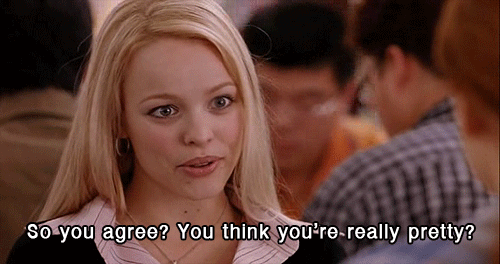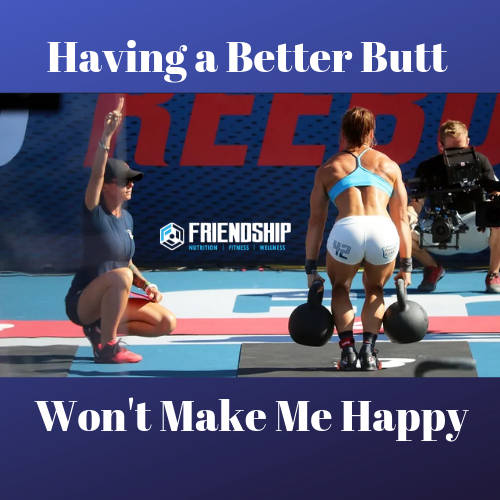"Having a Better Butt Won't Make Me Happier"
“I just don’t like being tall!” my 5-year old daughter Addie exclaimed the other day as she hit her head on the top of the car. It’s not the first time this has happened, and nearly every person who meets her will make a comment about her height. As this seemingly innocent observation about Addie's appearance has become a pattern, my husband and I have recognized the need to talk with her about how it makes her feel. We reassure her that being tall is a good thing and try to list the advantages of being tall. So now we’ve had multiple conversations about her body and she has become aware that other people notice it. At FIVE YEARS OLD. According to Psychology Today, one’s body image is the mental representation he/she creates, but it may or may not bear any relation to how he/she is seen by others. Body image can be shaped and influenced by early experiences, attitudes of parents, internal elements like emotions and moods, the social media and other content that a person consumes, and much more. Social media can be a scary, overwhelming place. There are so many different messages out there right now. The one that has gained a tremendous amount of buzz is Body Positivity -- the belief that all human beings should have a positive body image regardless of form, size, or appearance. The body positivity movement has been around for decades but has most recently gained momentum through hashtags, trending campaigns, and internet celebrities who have become famous and celebrated because they are different from the “norm.” The body positivity movement has allowed us the opportunity across all media platforms to see other bodies, not just strictly curated, photoshopped versions of what human beings “should” look like. This includes having a higher representation of minorities and people with disabilities. Last year for example, Mattel introduced three new types of Barbie -- curvy, petite, and tall -- in an effort to be more “inclusive.” With the blow-up in popularity of Functional Fitness & Resistance training methodologies, the body positivity movement shifted again. A renewed online presence and powerful social media following helped the community grow out of a few people working out in their garages into thousands of athletes in gyms across the world. In this community, women were now celebrated for being strong, proudly showing off defined biceps and muscular quads. All individuals, male and female, were now being celebrated for WHAT THEY COULD DO, not for just how their bodies looked.Gone are the mirrors and headphones of traditional gyms. The functional fitness movement shifted the focus from what “what do I look like?” to “what can I do?” and “what am I truly capable of?” We rely on the community, our friends, neighbors, co-workers, to pump us up and push us to our limits. The positive physical changes that we see are simply a byproduct of coming in everyday and kicking ass with our friends. We eat better, sleep better, have better relationships, and aesthetics seem to follow. Yet still, our community is not impervious to the notion that we should have shredded abs or toned arms or perfect [insert body part here].Almost every new client comes through our doors with goals that are primarily focused on physical appearance. They want to lose weight, get jacked, or just generally change their bodies. There usually isn’t anything wrong with these goals but the exciting part comes when these goals shift. How much they can lift replaces their desire to lose 10 pounds. Achieving that first pull-up becomes the focus, not getting perfectly toned arms. The physical appearance goals might remain, but they take a back seat to achieving personal greatness through the progress of physical abilities. So, the higher understanding and ultimate focus must come from self-love, which is not (should not) be tied to body image. It is the connection that you have to yourself. This doesn’t mean we allow ourselves to continue (or fall back into) bad habits. We must hold ourselves accountable and put systems in place to continue to push ourselves forward. But, we also must be kind to and accepting of ourselves. So often, I will compliment someone at the gym. “Hey! Congrats on getting that first pull-up!” or “Wow! You hit 150# on your back squat?! Awesome PR!” and I’m met with deflection or disappointment. “Thanks, but I still can’t get string two together” or “Yeah but I missed 160#.” It’s almost as if we are afraid of accepting the compliment and being thought of as conceited, i.e. Mean Girls: It is okay to love your body and want to change it. It is okay to be proud of what you can do now and keep pushing to want to do more. By choosing to speak and think in a positive way about yourself, being surrounded by the right people, and challenging your mental and physical state on a regular basis, you’re on the right track. We also must consider how the way that we talk about ourselves can positively or negatively influence those around us, especially young people. So as Addie continues to hit her head on the top of the car, I will be there to listen to her frustrations and to reassure her that she is so much more than this one physical attribute. And to teach her (and continue reminding myself) that we must speak to and about ourselves like we would a person whom we love -- with respect and admiration. Hopefully someday when she is on the playground dunking on fools, she’ll thank me. In a perfect world, you would finish reading this blog, go crush a workout, and then rush home to look at yourself naked in the mirror, all your insecurities POOF vanishing instantly, but I know it doesn’t work that way. There’s no perfect diet, special mantra, or cure-all self-help book. It can be a day-to-day battle. And it is a battle that every single person fights in his or her own way. Wellness is “the quality or state of being in good health especially as an actively sought goal.” When we think about wellness, which is something that is very important to us at Friendship, we have to consider that it looks different for everyone. And it might not look the same for one person all of the time. Wellness (similar to fitness and nutrition) might have to ebb and flow, be adjusted and changed, as life happens. Family situations, personal losses, school challenges, job opportunities, just general seasons of life can influence the definition of wellness for a person.Having the “perfect” body won’t make you happier. Instead, choose to try your best, treat yourself with respect, and surround yourself with awesome people who both hold you accountable and lift you up. By focusing on those controllables, lifelong health, happiness, and self-acceptance is possible. If you want a Coach to help hold you accountable to this mentality, guide you on your path to loving your body and building this resilient mindset, please connect with us here, we would LOVE to be your catalyst of change!
It is okay to love your body and want to change it. It is okay to be proud of what you can do now and keep pushing to want to do more. By choosing to speak and think in a positive way about yourself, being surrounded by the right people, and challenging your mental and physical state on a regular basis, you’re on the right track. We also must consider how the way that we talk about ourselves can positively or negatively influence those around us, especially young people. So as Addie continues to hit her head on the top of the car, I will be there to listen to her frustrations and to reassure her that she is so much more than this one physical attribute. And to teach her (and continue reminding myself) that we must speak to and about ourselves like we would a person whom we love -- with respect and admiration. Hopefully someday when she is on the playground dunking on fools, she’ll thank me. In a perfect world, you would finish reading this blog, go crush a workout, and then rush home to look at yourself naked in the mirror, all your insecurities POOF vanishing instantly, but I know it doesn’t work that way. There’s no perfect diet, special mantra, or cure-all self-help book. It can be a day-to-day battle. And it is a battle that every single person fights in his or her own way. Wellness is “the quality or state of being in good health especially as an actively sought goal.” When we think about wellness, which is something that is very important to us at Friendship, we have to consider that it looks different for everyone. And it might not look the same for one person all of the time. Wellness (similar to fitness and nutrition) might have to ebb and flow, be adjusted and changed, as life happens. Family situations, personal losses, school challenges, job opportunities, just general seasons of life can influence the definition of wellness for a person.Having the “perfect” body won’t make you happier. Instead, choose to try your best, treat yourself with respect, and surround yourself with awesome people who both hold you accountable and lift you up. By focusing on those controllables, lifelong health, happiness, and self-acceptance is possible. If you want a Coach to help hold you accountable to this mentality, guide you on your path to loving your body and building this resilient mindset, please connect with us here, we would LOVE to be your catalyst of change!
[button link="https://app.monstercampaigns.com/c/hbfewt5wbw6zpwdxnf6o/" type="big" color="black" newwindow="yes"] Click Here for More Info[/button]

